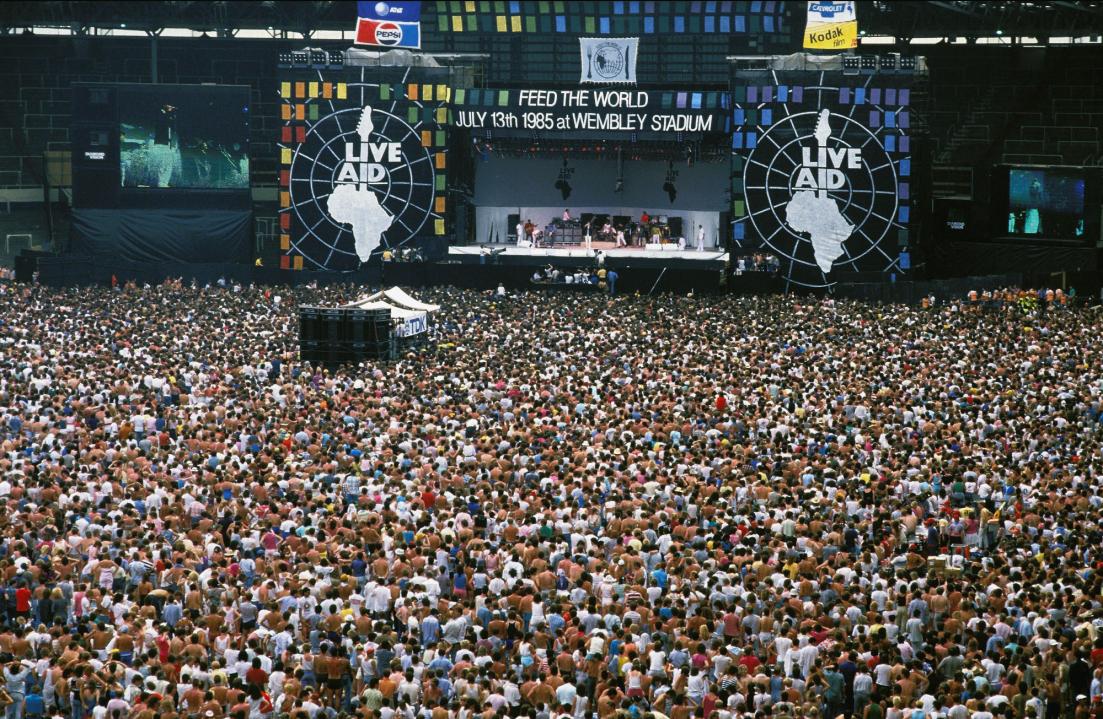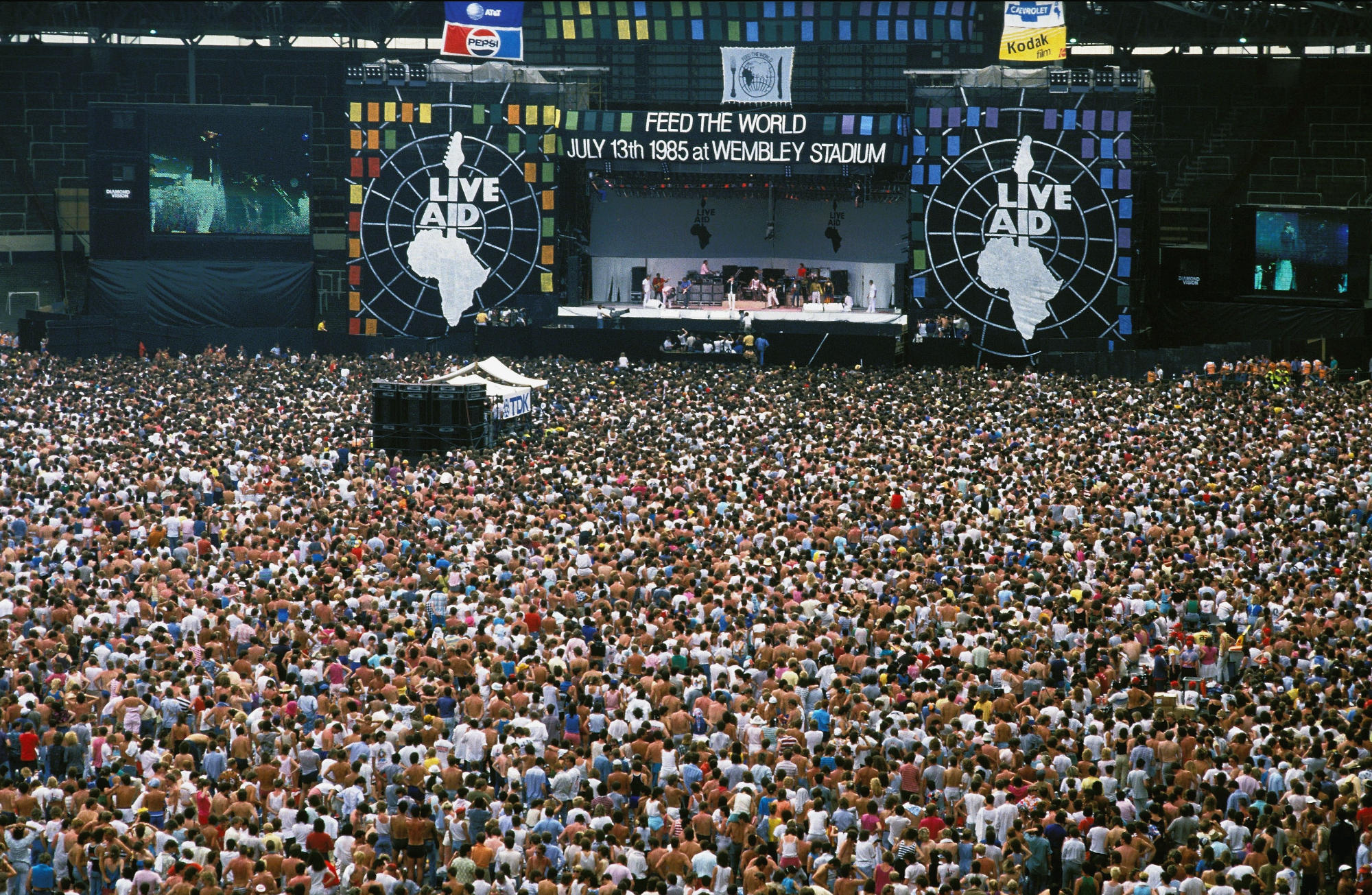Today is the fortieth anniversary of Live Aid, the epic televised pop concert – or ‘global jukebox’ – designed to raise funds to alleviate the devastating Ethiopian famine. The proceedings were divided between Wembley and the Kennedy stadium in Philadelphia. It was billed, even at the time, as an epochal day, an event that would change the world and change pop music. And I think it was – but maybe not in the way everybody thought.
So, we exported Marxism to Ethiopia and it starved to death – and now we had the temerity to add Spandau Ballet, Phil Collins and Nik Kershaw on top
I was 17, and though I couldn’t articulate why, I felt that there was something wrong about the whole affair. ‘Crowds, properly worked up by skillful demagogues, are ready to believe anything,’ H.L. Mencken wrote in 1918, and I felt in my bones that Bob Geldof, however well-intentioned, was rousing a rabble and flattening their thoughts.
Modern mass-produced western pop music, for me, just doesn’t belong outdoors. It is a wonderful thing – but it is unnatural, synthetic, and contrived. It is best enjoyed alone at home or in small interior venues. Enormous rallies exalt it beyond its range, or rather they alter it into a mass Bacchic rite.
I could feel a strange cultural gear shifting, even though I couldn’t put it into words. For me, Live Aid felt like the end of something, or a transformation of something beyond its natural limits. A study of Spotify data in 2018 reported that our musical taste is locked in when we are young teens – 14 for men, 13 for women. It follows that the first changes in music that happen after that age are going to be particularly jarring for us. To an ordinary disinterested observer, the differences between the charts of 1982 and 1985 will seem very minor. But to me, at that crucial age, it was very apparent that something had dropped off, and Live Aid put the tin hat on that.
The pop scene of 82 was playful, varied and – however flat footed – innovative. Soft Cell, ABC, Yazoo, The Associates, The Teardrop Explodes, Shalamar, Dexy’s; they were all very different. Live Aid was a massive top-down corporate flattening-out of all that. It was the return of superannuated rock gods and the establishment of a gaggle of newer, much dumber concerns – Madonna, U2 and Paul Young. Pop was never exactly Mensa, no, but the brains it did have evaporated that day, and they never really came back.
My little new wave bubble was well and truly burst. It had run off the fumes of Bowie’s 1977 albums Low and Heroes, and in a strange way this came full circle with Bowie’s set at Live Aid. The song ‘Heroes’ was reborn that day – the edge and the angst of it sawn away as it became a self-glorifying stadium rock anthem.
There were other oddities and infelicities in the line-up. The inclusion of Adam Ant, who hadn’t had a sniff of a hit for years, just seemed peculiar in 1985. Bryan Ferry, with a back catalogue of huge singalong smashes, decided instead to plug noodling non-single tracks from his latest album. And there were frequent crass juxtapositions, the most ‘powerful’ being the playing of the twee, maudlin synth whinge ‘Drive’ by The Cars over footage of dying Ethiopian children. Pop music, a marvellous bauble, was simply not equipped for these emotions or situations.
The other thing which gave me the abdabs was the idea that pop stars were now moral exemplars. From that day on we were supposed to revere these people. Cue the pompous windbaggery of Sting, Bono, etc. jetting around the planet combining their grotty little ditties with geo-politics and trite zero-sum economics platitudes – ‘they have nothing because we have everything’. Because the troubles of the world were somehow all our fault.
In a way, they were. The Ethiopian famine certainly was, but not in the way Live Aid blithely assumed. It was the direct result of the deadliest of western exports, Marxism. The Derg regime of Ethiopia, the Red Terror, the forced farm collectivisation and land ‘reforms’. The Marxist government of the dictator Mengistu is estimated to be responsible for the deaths of two million Ethiopians in the famine. But don’t worry. Mengistu is living in luxury in exile in Harare, today.
So, we exported Marxism to Ethiopia and it starved to death – and now we had the temerity to add Spandau Ballet, Phil Collins and Nik Kershaw on top. Worse, we had idiot westerners like the Style Council advocating for the same ideology, from the safe distance of Woking, enjoying all the freedoms and plenty of western capitalism, and knowing full well that their puerile political bluff would never be called.
So I won’t be joining in the Live Aid anniversary celebrations today. It makes me feel quite queasy, even 40 years on.









Comments